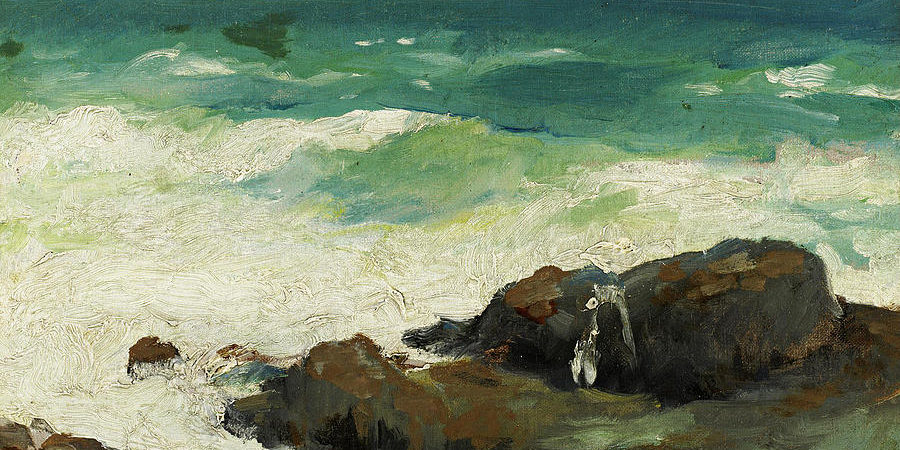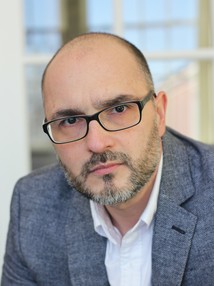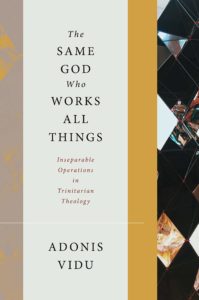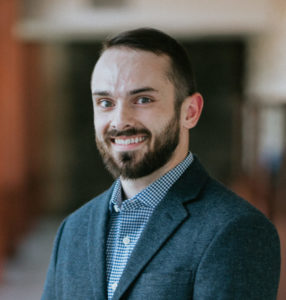
10 Questions with Adonis Vidu: An interview about our Triune God, Teaching Theology, and the Local Church
The Trinity is not a cold concept of speculative knowledge. Nor is it a doctrine that is only able to be understood by the spiritual elites. Rather, Adonis Vidu argues that “the Trinity is a mystery into which you enter only through prayer and purification, a taste that is acquired and cultivated.” Being the central dogma of the Christian religion, even the slightest deviation from Trinitarian orthodoxy will inevitably wreak havoc on other doctrines. Getting the Trinity right matters. In this interview, Credo Editor Lance English poses 10 questions to Adonis Vidu covering the Trinity, teaching theology, and the local church.
 Adonis Vidu (Ph.D., University of Nottingham) is Professor of theology at Gordon-Conwell Theological Seminary. He is a constructive theologian involved in a recovery of the patristic and medieval Trinitarian theology for the contemporary church, with an eye to its conceptual clarity and validity. Having done previous work in theological epistemology, hermeneutics, and the doctrine of the atonement, his latest research focuses on recovery, clarification, and defense of the ancient rule of the inseparable operations of the Trinity. This project also generates a fundamental rethinking of several loci of systematic theology through the doctrine of ‘divine missions.’ Dr. Vidu is married to Adriana, and they have one daughter, Hannah. He also served as an elder at Grace Chapel, Lexington.
Adonis Vidu (Ph.D., University of Nottingham) is Professor of theology at Gordon-Conwell Theological Seminary. He is a constructive theologian involved in a recovery of the patristic and medieval Trinitarian theology for the contemporary church, with an eye to its conceptual clarity and validity. Having done previous work in theological epistemology, hermeneutics, and the doctrine of the atonement, his latest research focuses on recovery, clarification, and defense of the ancient rule of the inseparable operations of the Trinity. This project also generates a fundamental rethinking of several loci of systematic theology through the doctrine of ‘divine missions.’ Dr. Vidu is married to Adriana, and they have one daughter, Hannah. He also served as an elder at Grace Chapel, Lexington.
Your journey into academia spans multiple continents. Can you tell us a little bit about that journey?
I was born to Christian parents, both coming from families associated with the early Baptist witness in Romania. At 18 I enrolled in Emmanuel Bible Institute in Oradea (now Emmanuel University), a local Bible college founded by our church, seeing myself following my father, on a path to pastoral ministry. Things turned out differently than I thought and I eventually pursued an academic vocation combined with a passion for preaching. At 22 I graduated with my Bachelors in theology and was retained on the faculty of our college. This was 1997 and theological education in post-Communist Romania had only a limited number of PhDs and schools were intensely recruiting promising graduates. In 1999 I completed a Masters of Philosophy at Babeș-Bolyai University in Cluj, Romania’s oldest university, where Karl Barth gave a visiting lecture in 1936 (during that same trip he also preached in my home town, Oradea!). That same year I started my doctoral journey under the guidance of Anthony C. Thiselton at the University of Nottingham, with a focus on the theological epistemology of postliberal theology (Hans Frei, George Lindbeck, James McClendon, etc.). During my postgraduate studies I continued to teach intensives at my Bible college, to which I returned full time in 2003 as a freshly minted doctor. In 2006 I moved to the University of Bucharest, a state university which started a department of Baptist Theology, where I taught apologetics and some theology. Finally, I moved to Gordon-Conwell in 2008.
You started teaching theology at the age of 22. If you could write a letter to your younger self, what advice would you give?
I’d probably start with ‘Keep it simple, stupid!’ Being barely 2-3 years older than my students creates a pressure to prove oneself. In the process I didn’t know how to make things simple. A lot of that comes with experience. The more you know the less you think you know everything, I guess. But the fact is, in an ideal world one should not start teaching theology at 22.
Your new book, T he Same God Who Works All Things (Eerdmans, 2021), is the first book-length treatment of inseparable operations covering the doctrine’s biblical, historical, and theological basis. If readers could only take away one thing from your book, what would you want that one thing to be?
he Same God Who Works All Things (Eerdmans, 2021), is the first book-length treatment of inseparable operations covering the doctrine’s biblical, historical, and theological basis. If readers could only take away one thing from your book, what would you want that one thing to be?
My book is, at one level, making a correction to a certain functional tritheism evident in how we often ascribe different works and we speak of different roles for the divine persons. I would want my readers to understand that this was exactly the interpretation rejected by the early church as it clarified its trinitarian theology. Further, that armed with such a logic the divinity of Christ and of the Holy Spirit would never have been confessed. Finally, that the doctrine of inseparable operations – that the Father, Son, and Holy Spirit work exactly the same things – is precisely the biblical discovery that buttresses the doctrine of the Trinity and not some metaphysical add-on.
You began working on The Same God Who Works All Things before the Trinitarian firestorm of 2016. How did the events and conclusions of that controversy inform your research and writing process?
Interestingly, hardly at all. The manuscript was completed at the end of 2018, and my research basically started in 2012, after I finished my previous book on the atonement. The first I had heard of the debacle was through blogs and social media. It was immediately clear to me that proponents of ERAS/EFS were assuming a form of social trinitarianism, without which their position could not get off the ground – as it wouldn’t make sense on a classical trinitarianism with a doctrine of inseparable operations, according to which the persons share the same being, power, and will. You will note that I do not go ballistic on social trinitarianism in my book. There is one section where I discuss Swinburne’s trinitarian model, but I am fully aware that there are all kinds of constructions of ST. At the same time, I share a certain kind of apophaticism with regard to the relationship between the persons and the substance.
At Credo, one of the things we try to do is equip pastors and ministry leaders to teach Classical doctrines to the people in their churches. What counsel would you give to those trying to teach doctrines like inseparable operations to their congregations?
This is a topic I am thinking about a lot these days. So much has changed in the expectations of our parishioners and their tolerance for solid food. I think we need to start thinking strategically rather than tactically. Turning the tide towards doctrinal preaching is a long-term project, and not just a matter of individual sermons. In my view it needs to involve a number of elements: (1) recovering the centrality of creeds and confessions in the life of the church; (2) making catechism more central, either as connected to baptism, or the general teaching ministry of the church; in connection to this, youth ministry must pay a lot more attention to Scripture and creeds than to games and fun. There are certain popular YM curricula which are ridiculously shallow and lack all interest in the doctrines we hold dear; (3) having a good balance between expository and doctrinal preaching; (4) finally, worship is essential: particularly the sacraments of Lord’s supper and Baptism, but also congregational singing. Too often we just go through these motions, without pausing to reflect on the mystery being unfolded before our eyes and delighting in the enormity of the grace of God. These events and practices are so profoundly theological!

